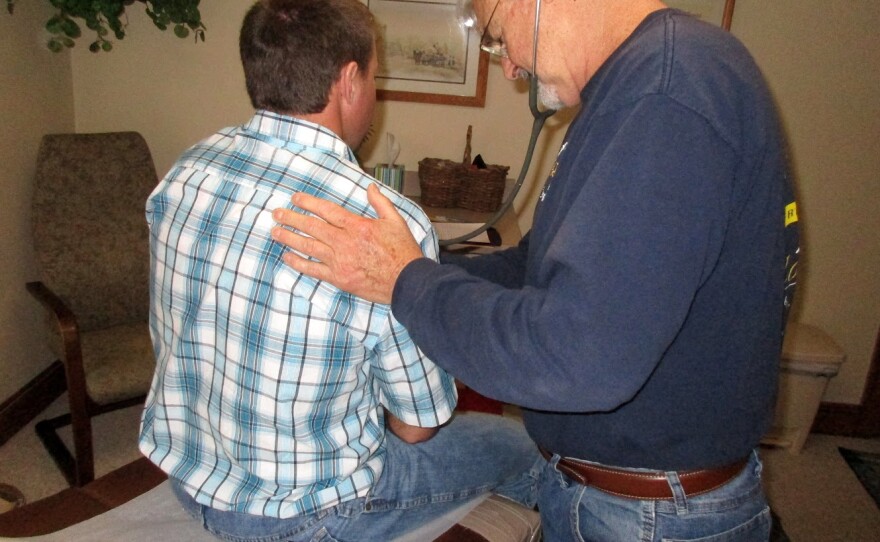It’s not so much a statement about the health care system, or a model for how it should be fixed. Instead, it’s more like a doctor just arrived at his own approach, sidestepping convention and filling a niche. WMRA’s Christopher Clymer Kurtz visited the clinic of one general practitioner working outside the health insurance system.
Dr. Andrew Blay is dressed for his work day in white sneakers, jeans, a long-sleeve shirt as he enters the house that he converted into Cooks Creek Clinic. It’s just feet from noisy Route 42 traffic south of Harrisonburg.
DR. ANDREW BLAY: You can leave that open--it's a little more inviting. This is Becky, my nurse.
Blay and Becky Taylor have worked together for 37 years in emergency rooms, a family practice, urgent care, and this clinic, where they are the only staff and only make same-day appointments and take walk-ins.
BLAY: Let me get a Diet -- you want a Diet Coke? I generally have one in the morning.
Last week Virginia Public Radio reported on a direct primary care model for general practitioners in which people pay a monthly fee to their doctors in exchange for medical care as they need it, insurance middle-men aside. Dr. Blay’s clinic takes a slightly different approach: in addition to not accepting insurance, it also doesn’t have members -- just a flat $50-per-visit fee.
BLAY: It's so simple that a lot of people get confused. I mean, they’re not sure how -- Are you sure it’s going to work?
About 50-60 patients visit each week. The kitchen in the old house serves as the check in/check out room. Personal photos cover the cupboards, a handwritten sign above where the stove used to be says “Becky’s Office,” and the credit card reader sits on the counter next to the sink. Elsewhere in the house is the waiting room with wicker rocking chairs, two small exam rooms, a baby-gated stairway that leads up to Blay’s office and his dog Sammy’s daytime hangout.
Oh, and how many computers?
BLAY: None. It’s all paperwork.
It’s a model that has worked for him.
BLAY: I thought, maybe if I charge a fair price, keep it simple, give people the time, listen a little bit, the business end of it may take care of itself, I may be able to handle that. It's worked. It really has. It's not overwhelming, which is good for me, because I get to spend a little time with people. You feel like at the end of the day you probably took care of those things that needed to be taken care of that day.
Timothy Jost is a retired law professor who writes for the health policy journal Health Affairs and lives just outside of Harrisonburg. He said that Blay’s clinic and other walk-in options like those offered in some states by Walmart or CVS do offer a useful service, in a niche.
TIMOTHY JOST: There are a lot of uninsured people in the United States even after the Affordable Care Act, and a lot of them are looking for discounted care. In a sense, it's one of the reasons I think why we don't have a single payer system in the United States and why there's so many people who remain uninsured, because a lot of them have kind of worked out various kinds of informal arrangements that work for them.
However, he says, those arrangements aren’t the answer to all the problems of the nation’s healthcare system.
JOST: If you get cancer and need serious chemotherapy, he's probably not going to be able to do that for you, and you're certainly not going to be able to get the drugs at an affordable price unless you have some kind of insurance coverage.
To serve patients, Blay relies on his decades of experience. He doesn’t have ready access to extensive lab work or MRIs and the like. He sends people with immediate, pressing needs to the emergency room; if they have a chronic need, they have to find a different primary care physician.
A lot of the time, though, people just need simple things: a tetanus shot, or a mole checked.
BLAY: What’s happened through the week?
PATIENT CHRIS SHOWALTER: Just more of the same. I mean, fever’s been the main thing. Every time I get off Ibuprofen or something it just spikes up.
Dairy farmer Chris Showalter was a walk-in, with flu symptoms.
SHOWALTER: It's hard to milk cows and be sick. So yeah, if you can get something to help me, that's what I'm after.
At the end of the visit, Dr. Blay takes Showalter to the kitchen. Nurse Taylor processes the credit card payment.
BECKY TAYLOR: Thank you.
Besider her, Blay writes a prescription.
Blay’s Board Certification expired about a decade ago, when he says he chose not to shell out cash for a renewal. He also says he can’t afford malpractice insurance and so doesn’t carry it. But that doesn’t bother Showalter. I called him a few days after his visit.
SHOWALTER: It doesn’t concern me. I don't have insurance, either.
About a third of the clinic’s patients are like Showalter, who carries a card that says his Old Order Mennonite church will pay if he can’t. His recent spur-of-the-moment visit and prescription did the trick for him.
SHOWALTER: I feel good. It took care of it.
In this case, perhaps you could say, “Like doctor, like patient” -- each operating in a broader context but with their own priorities that, underneath a nation roiled in debate and change, seem to be working just fine.




